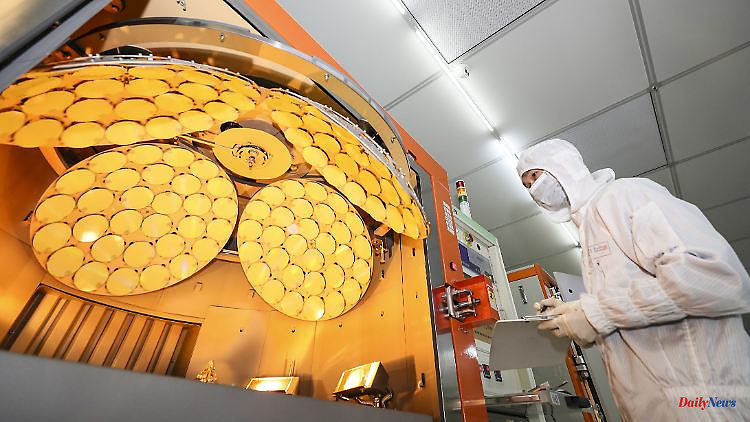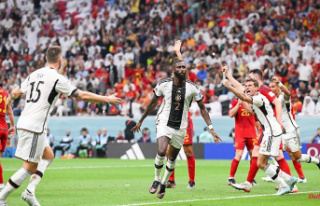According to an analysis by the Ministry of Commerce, it is only a matter of time before China absorbs Taiwan, according to a media report. Germany should free itself from its economic dependence on the People's Republic. Easier said than done.
According to a media report, employees of Federal Minister of Economics Robert Habeck expect Taiwan to be annexed by China by 2027 at the latest. This is the 100th year of the founding of the People's Liberation Army, the portal "The Pioneer" quotes from a confidential China strategy of the ministry. Germany's potential for blackmail is high given the economic ties.
The ministry announced that it would not comment on internal work statuses and processes. However, it is public knowledge that the government wants to realign investment guarantees for German companies abroad. In the case of state safeguards for investments, there should be a stronger incentive to expand into other countries in order not to become even more dependent on China.
The internal paper, which is available to the news portal, says: "The dependency on raw materials, which are also required for the digital and ecological transformation, is particularly problematic." The 100-page document was not coordinated with the federal government. However, Habeck accepted it this week in a management round and promised a speedy implementation of measures. For example, new reporting obligations are planned for German companies with strong China business such as VW or BASF, as well as stress tests for certain companies for the loss of China business.
The authors of the paper therefore warn that Germany must diversify its trade relations and focus on alternative future markets such as Asia-Pacific, Latin America and Africa. German-Chinese economic projects, on the other hand, should receive less political support. The ministry employees want to exclude Chinese suppliers for preliminary and intermediate products of the critical infrastructure.
Taiwan is the world leader in electronic components that are used in cars, laptops and telephones. According to a study by market researcher Trendforce, Taiwanese companies carried out 64 percent of the world's contract manufacturing of semiconductors last year. The world's largest contract chip manufacturer Taiwan Semiconductor Manufacturing (TSMC) produced for US customers and German car manufacturers as well as for China.
China, on the other hand, is by far Germany's most important trading partner, and more goods are imported from no other country. The country is the second most important customer for German exports. In addition, there are numerous intermediate products from the People's Republic in products from other countries such as Vietnam. "That's the big problem when solving China: The new suppliers themselves source from China," said Klaus-Jürgen Gern from the Kiel Institute for the World Economy (IFW) in an interview with ntv.de. "Often the decoupling seems greater than it is."
Decoupling is also difficult due to the huge amount that is produced in China. The large country has become so specialized in industry and manufacturing that 15 percent of global industrial production is now located there. "This amount cannot be easily replaced," emphasized Gern. "Everyone who is looking for alternative suppliers rushes to the small quantities that can be produced in other countries." This also drives up prices. Building up additional production capacities would take decades rather than a few years. New problems such as regulations, corruption or political instability also arise at alternative locations.
Another reason for manufacturing in China is its raw materials. According to Gern, China also has a dominant position in the raw materials for production. For example, China has large market shares for aluminium, copper and steel; above all, the processing of many raw materials takes place there.
Diversifying supply chains therefore costs money and time. The construction of a new chip factory, for example, takes about five years, as Gern emphasized. Since the industry is highly specialized, the economist also considers it questionable how independent a European factory like the one planned in Magdeburg can actually be. "In the end, Intel may be making chips there with parts from Taiwan."
China invokes the "One China Policy". According to this doctrine there is only one China, Beijing is the only legitimate government. Although Taiwan has long been acting independently, it fulfills all the requirements of international law as a separate nation. However, according to Beijing itself, it would use a formal secession as an opportunity to resort to "non-peaceful means". The same applies if all peaceful possibilities for "reunification" have been exhausted.
Taiwan and China have long used the vague "1992 consensus" as the basis for a rapprochement. It offered leeway because both sides acknowledged that there is only one China but accepted that they had different ideas about it. However, Taiwan's President Tsai Ing-wen doesn't want to hear anything more about it - also because it represents old Chinese thinking. Only 2.4 percent of the 23 million Taiwanese see themselves as Chinese, two-thirds feel like Taiwanese.
With a successful invasion, the superpower China could open the gateway to the Pacific and challenge the United States. However, the United States has been supplying Taiwan with weapons for a long time. When diplomatic relations were established with China in 1979, the Americans undertook to take care of Taiwan's defense with their own law. The "Taiwan Relations Act" pledges that the US "always stands by Taiwan's side".
High-ranking US military still see a Chinese attack on the island 130 kilometers off the Chinese mainland as far too risky for Beijing. But fears of another war are growing on both sides. For the West, this would not only start another economic war with a far more powerful opponent than Russia - two nuclear powers, China and the USA, would clash head on.












